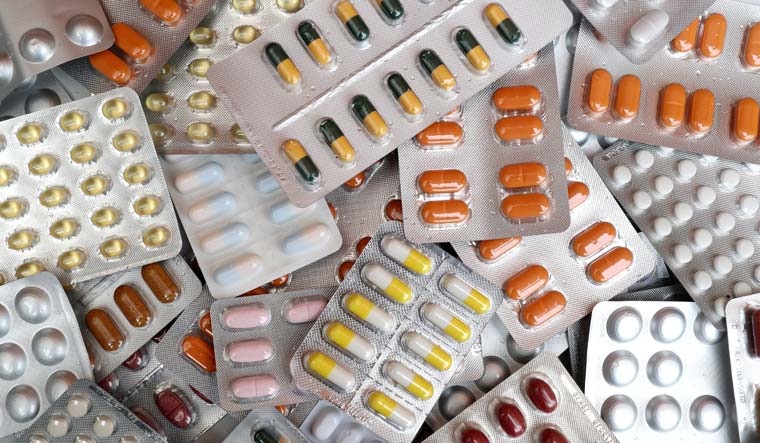The Indian pharmaceutical sector saw a boost in exports thanks to a spike in demand for pharma products induced by the Covid-19 pandemic and countries adopting a ‘China plus one’ policy. India's formulation and bulk drug exports improved by 18 and 9 per cent on-year (in constant currency) during the first half of the current fiscal compared to 11 per cent and -1 per cent, respectively (in constant currency) for the whole fiscal.
As per a recent report by CRISIL, there has been an increase in demand for pharma products, induced by the Covid-19 pandemic, and hoarding of supplies by some nations in the wake of production disruptions, have boosted exports. Besides that, increasing customer diversification away from China with respect to bulk drug policy, coupled with some countries adopting a ‘China plus one’ policy, has led to increased demand for active pharmaceutical ingredients (APIs) from India.
CRISIL report points out that a robust demand from most economies boosted India’s exports in the first half of the current fiscal and major regions such as the US and Europe brought good exports growth due to increased demand for drugs, especially antivirals and antibiotics for treatment of Covid-19. In addition to this, global de-risking of the supply chain has boded well for the Indian bulk drug exports.
Chinese supply disruptions in early 2020 and persistent quality issues provided an opportunity for the Indian pharma players as many global customers started looking at India as an alternative supplier of bulk drugs. Further, Indian API exporters have been able to garner good realisations on their exports during the first half of this fiscal.
However, as per the CRISIL report, the Indian domestic market fell by 2.5 per cent in the first half of the current year. Given the lockdown in April and May, the domestic pharma market logged a 6 per cent decline in growth in the first quarter of this fiscal. Closure of smaller clinics and hospital OPDs and postponement of surgeries resulted in slower sales of drugs in the domestic market, although some support was provided by an increase in sales of chronic therapies such as cardiac and anti-diabetes medicines. This continued for some more time as the growth in the domestic market remained muted in the second quarter as well, leading to an overall decline of 2.4 per cent for the first half.
It is expected that the domestic market will bounce back in the later half of the current fiscal as demand disruptions ease. Revenues of pharma companies will show an uptrend this fiscal driven by the exports growth in both formulations and bulk drugs and the players are expected to have 7-8 per cent (in rupee terms) on-year growth this fiscal. The CRISIL report further observes that the gradual easing of lockdown restrictions, coupled with demand for pharma products and bulk drugs in both exports and domestic markets, will aid this revenue growth. The report pointed out that a ramp up in specialty drugs and biosimilar exports, along with strong domestic sales, will aid revenue growth for pharma companies in the next fiscal, too. Lower travel and marketing costs on account of the lockdown, along with a favourable business mix had led to an improvement in margins for formulation and bulk drug players in the first half of this fiscal. Operating expenses for pharma firms had reduced due to a fall in movement of medical representatives and other cost cuts, along with rationalisation of manpower.
also read
- Indian pharma industry has a strong growth trajectory
- Three employees of Noida-based pharma firm arrested in relation to Uzbekistan cough syrup deaths
- Central, state teams to inspect Chennai plant after Global Pharma recalls eye drops in US
- Separate funds for R&D, formulation, API: What pharma sector expects from Union Budget 2023
The CRISIL report further observes that the withdrawal of the Merchandise Exports from India Scheme (MEIS) will have some impact on the margins of the export-oriented pharma players. The government has announced the withdrawal of the MEIS scheme by December 31, 2020 and will be replaced by the Remission of Duty or Taxes on Export Products (RoDTEP) scheme. Further, incentives under MEIS have been capped at Rs 20 million per exporter.
A report by Emkay Global Financial Services has observed that global pharma companies, especially those based in the US and Europe, are actively looking to de-risk their supply chain from China and may exercise different options. They may try to produce APIs in-house or outsource manufacturing to other US or Europe-based companies or they may choose a supplier from a developing country ex-China. The report points out that the first two options are not viable for their entire portfolio, leaving the third option open. It is here that the Indian pharma companies have an edge, given their long history of supplying APIs and formulations globally plus offering better quality and regulatory compliance and better supply reliability. The report says that while the discussions around adding new suppliers have started, the financial impact will take time as adding an API supplier will take 6-18 months, depending on the regulatory pathway.







